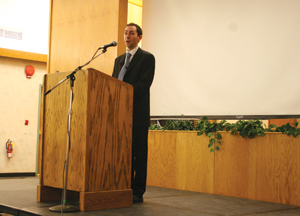
The Foundation for Individual Rights, or FIRE, visited Binghamton University in an effort to defend and promote individual rights here. Their visit follows an investigation of a student rights violation by a department at Binghamton University and the proposal of changes to the Student Code of Conduct.
Adam Kissel, director of the individual rights defense program for FIRE, held a speech Wednesday night entitled “Liberty in Peril: The State of Freedom on Campus” in the Susquehanna Room of the Old University Union.
According to their Web site, FIRE is a non-partisan organization whose mission is to defend and sustain individual rights at America’s colleges and universities. The organization, which will soon celebrate its 10-year anniversary, defends individual rights such as freedom of speech, legal equality, due process, religious liberty and sanctity of conscience.
At this speech, sponsored by the Binghamton Review, College Republicans, College Libertarians and the Student Association’s Office of the Vice President for Academic Affairs, Kissel spoke about the importance of being proactive about student rights on a college campus.
“In FIRE’s experience, universities tend to restrict freedom of expression when they fail to publicly acknowledge that negative feelings are a natural part of the fully engaged valuable educational experience,” Kissel said. “Offense, confusion, embarrassment … all of these feelings are a natural part of the vigorous discussion among free persons, especially in a marketplace of ideas.”
FIRE became involved at BU last semester when the Department of Social Work of BU’s graduate program attempted to suspend masters student Andre Massena after they said he hung posters in August challenging the department for having hired the executive director of the Binghamton Housing Authority (BHA) — an agency the student thought was responsible for social injustice.
“We wrote an article for the December issue on Massena’s case and sent a copy to FIRE that they posted on the Web site,” Adam Shamah, editor in chief of the Binghamton Review, said. “FIRE suggested that they do a lecture at BU this semester. Over winter break we started planning and finalized a few weeks ago.”
According to Kissel, the University assigned Massena harsh and unconstitutional requirements to complete in order to remain in the program.
“He was required to submit formal apologies to a pre-approved list of people as evaluated by Professor Laura Bronstein, the department chair, and to complete a critical reflection paper of 10 to 12 pages on the topic of ethics in social work,” Kissel said.
After being informed of the case, FIRE wrote to Lois DeFleur, BU’s president, about the issue on Oct. 29. According to Kissel, the organization insisted that BU allow its students to openly criticize public officials, and even the University itself, without punishment.
According to Kissel, when violations are exposed by FIRE, the university involved often backs down, which is what he said happened in Massena’s case. Shortly after FIRE became involved, Bronstein sent Massena a one-sentence e-mail dropping the charges.
FIRE is investigating the department of social work after receiving reports that professors lowered Massena’s grade because of the posters, Kissel said.
FIRE also has a system in which they rate the student codes of conduct at schools across the nation, Kissel explained.
“We rate hundreds of schools with a red, yellow and green light system,” he said. “Green means the school has no violations, red means that the school has at least one code that is unconstitutional, and a school is yellow when they have policies that could be used to restrict speech, but they are not unconstitutional as written.”
Currently Binghamton has a yellow rating, but according to Kissel, the current changes being made to the Code of Conduct would resolve a number of the problems, and could get BU into the green light category.
During the question and answer section of Kissler’s speech, a member of the audience stood up and asked if handing out pamphlets or fliers to tour groups around campus would be a good form of getting information out to both potential students as well as administration.
Kissel said handing out fliers to tour groups would be a good way to let both incoming students as well as administration know about issues going on across campus. Administration would see potential students walking through their office with pamphlets, and become aware of the cause they were protesting.
When a college tries to protect you from negative feelings and words, the college is disrespecting your own maturity, Kissel said.
“If you go through all four years of college without being offended, you should ask for your money back,” Kissel said.


